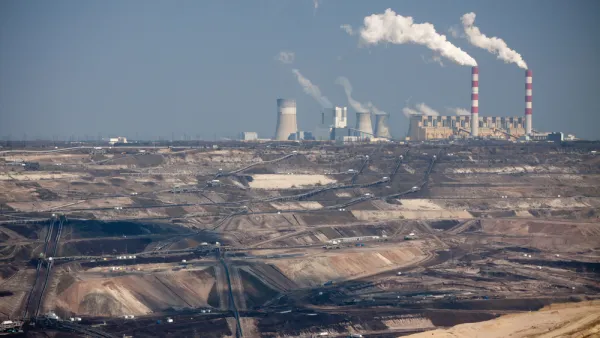A new study produced by an international team of scientists focuses on efforts to reduce the production of two shorter-term pollutants, rather than carbon dioxide, that drive climate change.
Brian Vastag and Juliet Eilperin write of measures to reduce the production of methane and soot, outlined in a study appearing in the journal Science, that could slow global warming, save millions of lives and boost crop production around the world.
"Previous studies have noted the benefits of reducing methane and soot. But the new study looked at the specific effect of about 400 actions policymakers could take. Of those, just 14 interventions - such as eliminating wood-burning stoves, dampening emissions from diesel vehicles and capturing methane released from coal mines - would offer big benefits."
Brooks Yeager, executive vice president for policy for the advocacy group Clean Air-Cool Planet, gave the report's positive reception a reality check, "I think it's a little dangerous to think you can do this instead of reducing carbon dioxide," Yaeger said. "If you don't reduce carbon dioxide, the benefits of reducing these [pollutants] will recede into the background and be overwhelmed by carbon."
FULL STORY: Study: Simple measures could reduce global warming, save lives

National Parks Layoffs Will Cause Communities to Lose Billions
Thousands of essential park workers were laid off this week, just before the busy spring break season.

Retro-silient?: America’s First “Eco-burb,” The Woodlands Turns 50
A master-planned community north of Houston offers lessons on green infrastructure and resilient design, but falls short of its founder’s lofty affordability and walkability goals.

Delivering for America Plan Will Downgrade Mail Service in at Least 49.5 Percent of Zip Codes
Republican and Democrat lawmakers criticize the plan for its disproportionate negative impact on rural communities.

Test News Post 1
This is a summary

Test News Headline 46
Test for the image on the front page.

Balancing Bombs and Butterflies: How the National Guard Protects a Rare Species
The National Guard at Fort Indiantown Gap uses GIS technology and land management strategies to balance military training with conservation efforts, ensuring the survival of the rare eastern regal fritillary butterfly.
Urban Design for Planners 1: Software Tools
This six-course series explores essential urban design concepts using open source software and equips planners with the tools they need to participate fully in the urban design process.
Planning for Universal Design
Learn the tools for implementing Universal Design in planning regulations.
EMC Planning Group, Inc.
Planetizen
Planetizen
Mpact (formerly Rail~Volution)
Great Falls Development Authority, Inc.
HUDs Office of Policy Development and Research
NYU Wagner Graduate School of Public Service



























